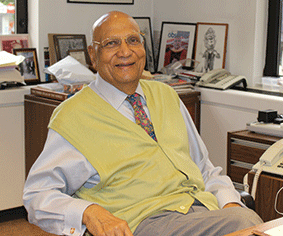Dilip Thakore interviewed the Rt. Hon’ble Lord Swraj Paul, chairman of the Caparo Group Ltd, London.
 As chancellor of the Thames Valley and Wolverhampton universities, you are actively engaged with higher education in the UK. To what extent, if at all do you share the pessimism of academics who say that learning outcomes and research standards in the UK are plunging?
As chancellor of the Thames Valley and Wolverhampton universities, you are actively engaged with higher education in the UK. To what extent, if at all do you share the pessimism of academics who say that learning outcomes and research standards in the UK are plunging?
I am chancellor of the University of Wolverhampton, a position I have held since 1999, soon after stepping down as chancellor of Thames Valley University — now known as University of West London. I also stepped down as chancellor of Westminster University in 2015 after serving there for nine years.
As far as the University of Wolverhampton is concerned, we are actively upgrading our facilities and research and have made a lot of progress. Wolverhampton University is as good as any global university in terms of inputs and outcomes. This year, over 7,000 students participated in graduation ceremonies staged in 12 countries, which goes to show not only the reach of this university but also the increasingly global make-up of higher education.
Would it be accurate to state that you have retired from the businesses of the Caparo Group and are now fully focused on the education promotion activities of the Ambika Paul Foundation and other charitable trusts established by you?
No, I have not retired from the businesses of the Caparo Group but certainly, I have stepped back from its day-to-day administration. When you have grown a business for nearly 50 years starting with a loan of £5,000, you can never retire from it. Although after the very tragic and unfortunate death last year of my son Angad who had taken on full responsibility as CEO, I have got a little more involved on a daily basis, I hope this will be for a short period. However, I don’t want to step away completely from the business I love.
Apart from Caparo, there are two things close to my heart — education and children’s causes. That is why the Ambika Paul Foundation, which we set up in 1978 in memory of my daughter, continues to address new projects.
You have also promoted the Ambika Paul School of Technology in Jalandhar, India. What is the extent of your involvement in Indian education and how satisfied are you with the progress of your initiatives in India?
I have no current involvement with the Ambika Paul School of Technology in Jalandhar. It was built by us and handed over to Punjab Technical University to run. However, I am a well wisher of this project.
What is your assessment of the manufacturing/engineering capabilities of British and Indian industry?
This is a very wide ranging question. As far as our business is concerned, our Indian plants for example with modern and up to-date machinery and buildings are far more contemporary because they were established in the past 20 years. Managements also vary from plant to plant. And in this day and age, we have to be constantly improving because we live in a highly competitive world.
What is the extent of your engagement with Apeejay Stya University and the Apeejay Education Trust established by your brother Stya Paul in India?
Apeejay Stya University and the Apeejay Education Trust were set up by our family and my eldest brother Stya Paul who was the head of the family had been looking after the educational institutions.
Since his death in 2010, his daughter Mrs. Sushma Paul Berlia has been supervising the education projects and doing a wonderful job. She and I are in regular touch. My relationship with her is like a surrogate father while she is almost like a daughter.
To what extent in your opinion have the prospects of Indo-British cooperation in education, trade and industry improved following Brexit?
Indo-British cooperation in education, trade and industry has always been very good and I think after Brexit, it will become even better. It’s a win-win situation. But more effort has to be made on both sides because today, everything is exchangeable and interchangeable. Ideas are not the monopoly of any particular country. Information technology has made everything possible and attainable and we should make more use of it.
There’s a lot of effort being made and I would like to see Britain and India making more use of opportunities. Britain is definitely starting to do a lot more in working with the Commonwealth countries of which India is the largest. So India needs to ensure it is open for business.